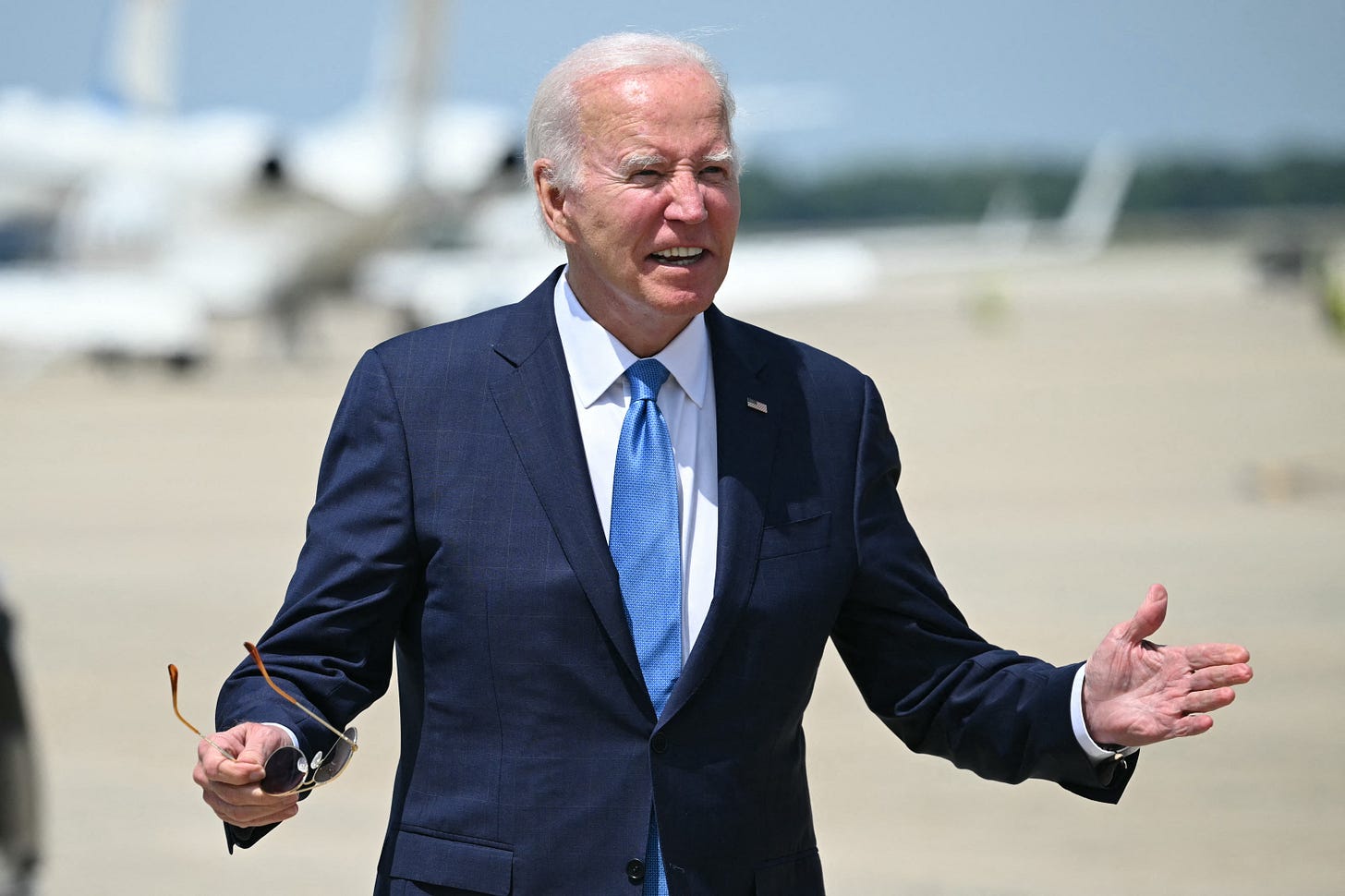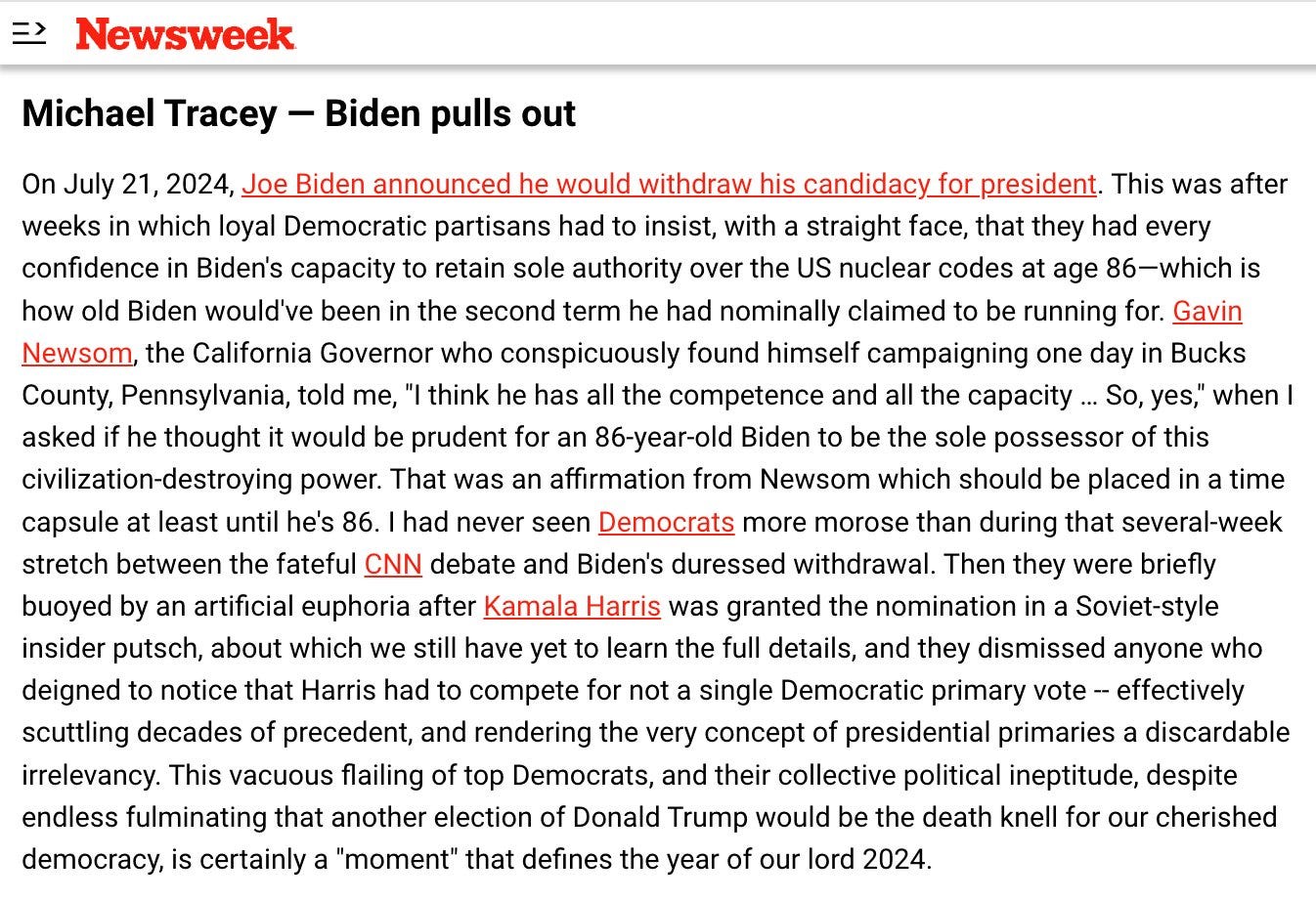"The Moment That Defined 2024"?
Part of me pedantically dislikes these year-end lists, because they inevitably exclude anything that occurred in the last two weeks of December, rendering that period a strange chronological void. They also tend to exclude anything that occurred from January to March of the preceding year, as the list-makers succumb to recency bias. However, I am not immune to using the calendar year as a mental sorting system, even though it’s a bit arbitrary, so I acceded to the request from Newsweek.
My favorite part was getting to reprise the statement I obtained from Gavin Newsom, in which he assured me that Joe Biden had all the competency to retain sole authority over the US nuclear codes at age 86. Note: observing the painful absurdity of Newsom’s statement should not be construed as an implicit endorsement of Donald Trump retaining sole authority over the US nuclear codes at age 82, which is how old he’ll be if he serves out the full term to which he’s now been elected. If anything, it should be construed a testament to the absurdity of the unilateral nuclear authority itself, which is troublesome even if wielded by a chipper 45-year-old.
Many have naturally pointed to the Trump assassination attempt as the “moment that defined 2024,” and while it was certainly a jarring “moment,” it may be remembered more for its sheer drama than any wider political consequence. The shooter, so far as anyone’s been able to ascertain, had no particular ideology, and seems to more fit the profile of an anti-social “school shooter” than a dedicated zealot. That surmise could change as more information gets revealed, and the incident almost certainly benefited Trump electorally, but as of now it resonates more for its nihilistic randomness than anything else.
Last night I happened to be listening to an old C-SPAN interview with Donald Rumsfeld, as one does on a Saturday night, and Rumsfeld recalled being present during the attempted assassination of Gerald Ford on September 22, 1975. Amazingly, this was the second attempt by a female assassin against Ford in two weeks. The bullet whizzed right past Ford’s head, Rumsfeld recounted, and then right past Rumsfeld’s own head; he was Ford’s chief of staff at the time. Was this seen as a seminal event in American history — or even of 1975? Not as far as I’m aware. That’s not to say there were no differences with the Trump assassination attempt that might have made it more significant. I’m just spitballing here, really.
Biden’s withdrawal, on the other hand, really had no good precedent in American history, and crystalized certain dysfunctions uniquely endemic to the current political era. So that’s the “moment” I chose for this admittedly arbitrary exercise. You can read the other contributions here (they’re kind of boring). And here’s my blurb in all its glory:




The Biden withdrawal is definitely a contender! The others, in the article, as you say, are boring. I imagine they are mostly all Americans who can't imagine that anything anywhere else might be important. From that perspective, history might claim Luigi to be a close second.
In the wider world, the rulings of the ICJ on the criminal actions by Israel, including that their entire occupation is illegal, might well be considered to have been a major development of huge importance, either by bolstering the rule of law in international affairs, or by bringing down the post-WWII institutions we have all gotten used to, and which served the US interests so very well, for so very long.
I think the moment that defined 2024 was Biden's debate performance. Laid bare in all its glory was all the endless gaslighting about Biden's mental capacity. The world saw that he was obviously suffering from dementia, and the reality that he was not the actual person leading the executive branch of government was truly shocking to many people.